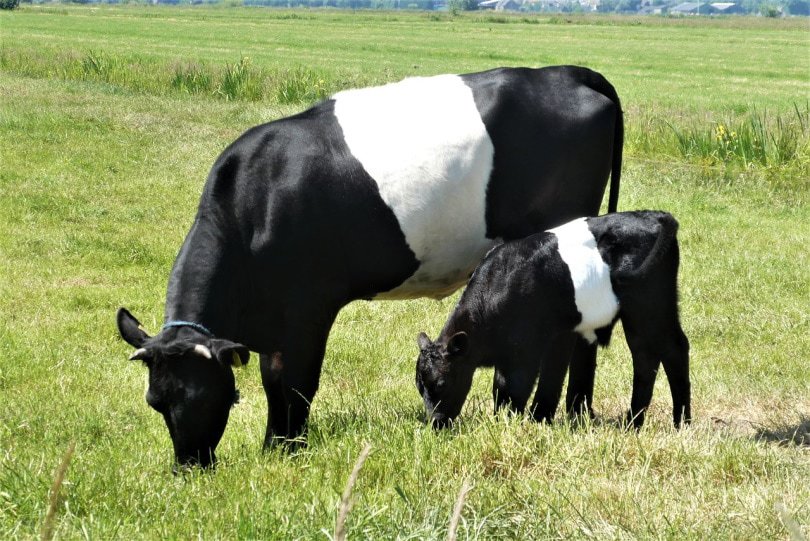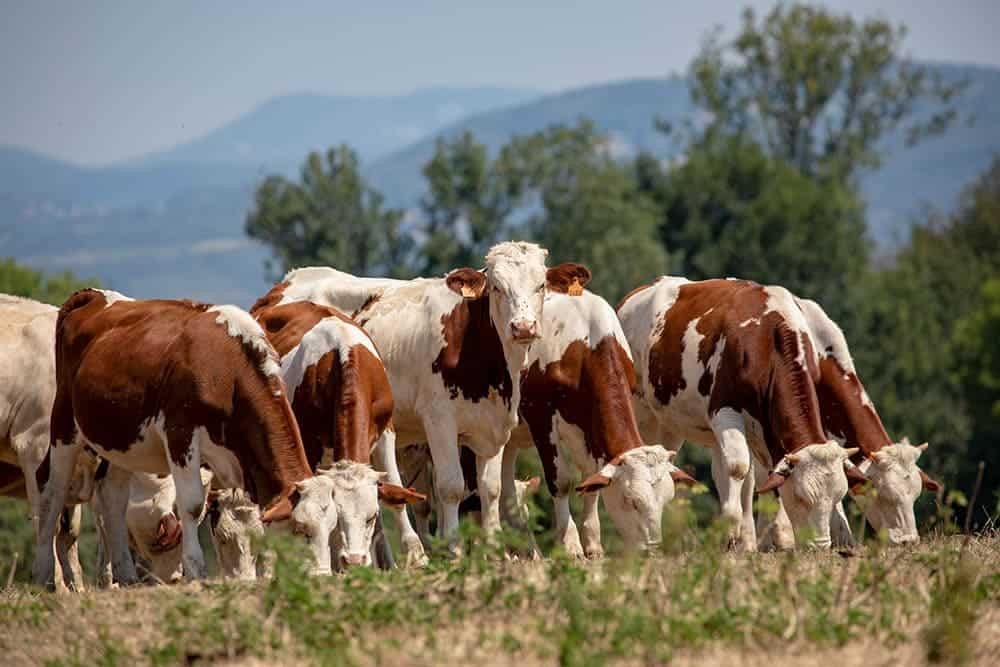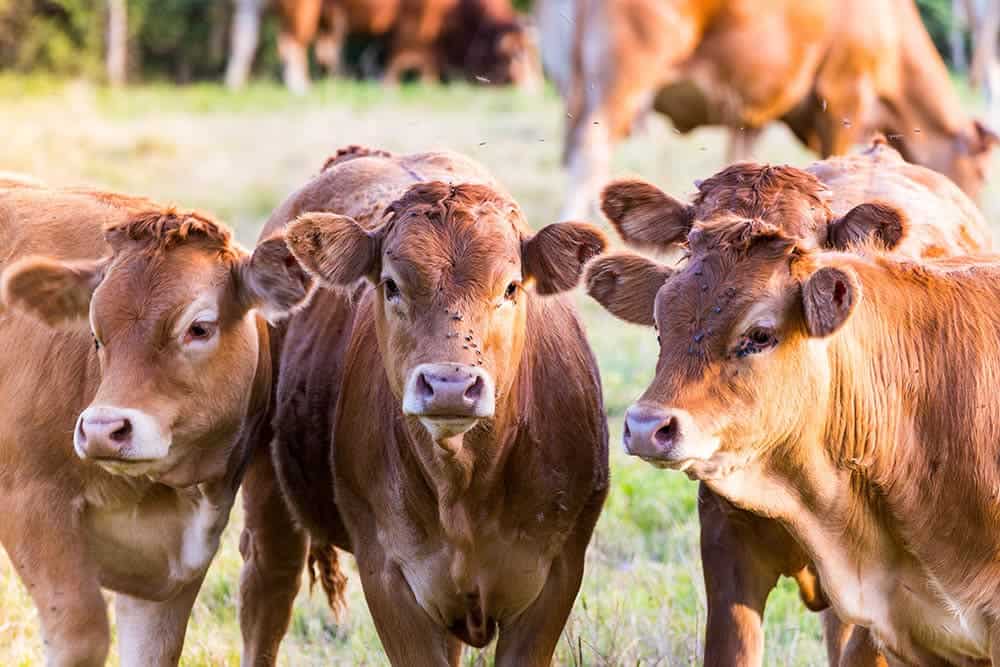Approved by Dr. Paola Cuevas
Cows are herbivores, which means most of their diet comes from plants. Occasionally, cows may eat insects while eating plants, but they are not specifically seeking out the insects for their diet. Instead, cows get all the nutrition they need from grass, hay, and other plants.
Because cows are herbivores, it’s important to provide cows with the right number of plants and nutrition. You should avoid feeding your cow meat and protein since their digestive system is not equipped to handle such foods.
In this article, you will learn all about a cow’s normal eating habits, as well as the dangers of feeding your cow meat. Keep reading to learn more.

Defining Terms
- Herbivore: Diet only consists of plants
- Omnivore: Diet consists of plants and flesh
- Carnivore: Diet only consists of flesh
- Obligate Carnivore: Diet must consist of flesh; animals that are unable to get their nutritional requirements from plants and bacteria
Are Cows Herbivores, Omnivores, or Carnivores? Fully Explained
Based on their nutritional needs, cows are herbivores. They can have a strict diet of only plants and lead a happy and healthy life. Veterinarians do not recommend feeding cows meats and 2020 animal products because of their herbivorous diet needs.
The herbivorous diet of a cow is due to its teeth and stomach system. The cow’s teeth are completely flat and blunt, which is perfect for grinding plants but terrible for shredding meat. More so, cows have a four-stomach digestive system that allows them to get all of the nutrition they need from plants alone.

Times Cows Will Eat Meat and Animal Products
Even though cows are completely healthy as herbivores, many are technically omnivores, though not on purpose. When eating grass and other plant matter, it’s common for cows to accidentally eat insects in the process. In small quantities, the insects are not dangerous for the cows and are just a natural consequence of eating from the ground.
Likewise, there are a couple of instances throughout the cow’s life that it will eat meat or animal products. Most commonly, cows eat animal products during the calving process. Of course, the calves will drink their mother’s milk, which counts as an omnivorous diet. Less obviously, the mother cow will eat the afterbirth too.
In dire circumstances, cows are even known to eat meat, eggs, and other animal products. This is incredibly rare and often only happens when the cow is dying or in serious need of a certain nutrient. It is not recommended to add or feed your cows meat and animal products.
All around, it’s best to classify cows as herbivores. Even though they do occasionally eat insects and other meat sources, they aren’t getting most of their caloric and nutritional needs from the insects, but from the plants that the insects are on.
- In case you were wondering: How Many Cows Are There In The US?
Can Cows Eat Meat?
Since cows are herbivores, you might be wondering if they can eat meat. Technically, cows can eat meat in the sense that they can chew and swallow the meat. That being said, just because cows can eat meat does not mean they should.
On the contrary, meat is not good for cows. It is believed that certain illnesses like mad cow disease stems from cows eating feed with animal products inside. Because of this theory, some countries outright prohibit feeding cattle meat.
Not to mention, cows simply do not have the teeth designed to properly chew meat. Because meat is much tougher than plants, it requires sharp teeth. As herbivores, cows have completely blunted teeth that aren’t sharp enough to tear the meat apart. If the meat is small, this won’t be an issue, but the cow may choke if it’s larger pieces of meat.
Because of these facts, cows should not eat meat. Although eating the occasional bug is no big deal, eating large quantities of meat is incredibly dangerous to the cow’s neurological health.

What Happens When a Cow Eats Meat?
What exactly happens when a cow eats meat? If a cow happens to eat an occasional insect on accident, nothing will happen, so there isn’t much to worry about if the cow consumes insects.
The real danger comes when cows consume meat or meals based on meat, blood, bones, and animal products. When exposed consumption of meat and animal products, cows are at risk of developing a very serious neurological disease called bovine spongiform encephalopathy, more commonly known as mad cow disease. This disease also represents a risk factor to humans as it is considered potentially zoonotic (meaning it can spread between animals, including humans). Cows that consume meat are also at risk of developing serious gastrointestinal issues, growth abnormalities and other health problems
What Is the Ideal Diet for a Cow?
The ideal diet for a cow primarily includes forage, such as grass and hay. The most economical way to feed cows is to allow them to graze in pastureland. Shockingly, most beef cattle consume 2.5% of their own body weight every day from their forage.
A cow’s daily protein requirements vary depending on their age, reproductive status, breed, and whether they are “beef or dairy cattle”. This protein should come from hay or supplements, not animal protein. You can occasionally feed your cow fresh fruits and vegetables as treats as well. Between the mixture of grass, hay, treats, and supplements, your cow will get all the nutrition it needs.

Final Thoughts
Cows are herbivores, which means they primarily eat plants. Although it’s normal for cows to occasionally eat insects or milk during the calving period, cows really only need plants to be healthy. Feeding meat to your cows leads to many health problems including gastrointestinal disease and the risk of a serious neurological disease.
If you are feeding a cow, stick to grass, hay, and supplements. Although this diet may sound bland and gross to us, it is perfectly tailored to your cow’s herbivorous body.
See also:
- How Much Space Does an Alpaca Need? What You Need To Know!
- What Is a Guard Llama? Can Llamas Protect Sheep?
- Do Alpacas Spit? Everything You Need to Know!
Featured Image Credit: Pitamaha, Shutterstock
